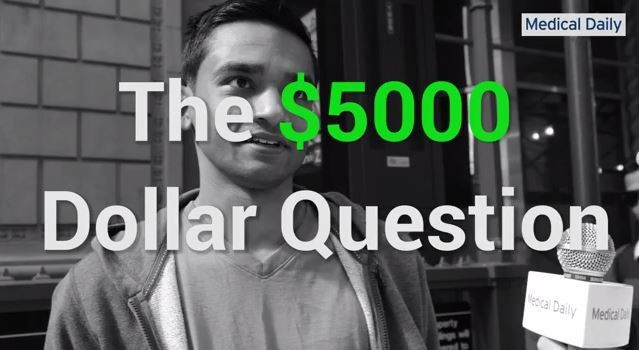Can Money Buy Happiness? What Happened When We Asked People On Wall Street

It’s been said money is the root of all evil. Why, then, is it so good at making us happy? Or is the happiness just a temporary illusion? When Medical Daily asked people on Wall Street how $5,000 could make them happiest, some knew immediately what they would spend their money on, while others needed to take time off camera before figuring out how they would maximize their happiness.
Can money really buy happiness, though? It depends on if you’re talking long- or short-term. From construction workers to businessmen and New York City tourists, the consensus is that in order to spend responsibly they'd need more than just $5,000. One man said it’d take six figures to convince him it's a good idea to spend his extra money on loans, mortgages, bills, but anything less, he said, should be used to buy immediate happiness. We’re living in a world of juxtapositions and gray areas in which an extra $5,000 will make a person act selflessly, while another will act impractical and self-serving. But who is to judge? Is there always an obligation to donate to the homeless or support research funding for a life-threatening disease?
The prosocial behavior that drives a person to make charitable contributions, buying gifts for others, and so on, could be driven by the selfish desire to feel good. Investing into others is scientifically proven to make us feel better than spending on personal expenditures, according to Stanford School of Business. Even if it’s giving away $1 to the homeless guy you pass every day on your way to the office, allocating funds toward the greater good can go a longer way than a beer after work.
The Fiscally Responsible vs. The Frivolous
Motivations and incentives are what decide the fate of each dollar in our pocket, bank account, and forlorn couch cushion coins. The way we spend our money is a direct reflection on our priorities, moral obligations, financial freedoms and limitations, long-term and short-term goals, and mindfulness. Today two-thirds of college students are burdened with some level of debt, with a total $1.2 trillion national debt. Mortgage debt teeters at a high $153,000 average per household and outstanding credit card debt carries with it $15,607 on average. It’s tempting to use that $5,000 toward chipping away at some of that debt, but the question is: Will that make you happiest?
Whether you throw your debt aside and cash your check into backpacking Europe, or you put it toward a down payment of a car you need to get to and from your job, happiness is the key here and we’re all so different. Regardless of why we spend a certain way, we vote with our dollars by investing into certain companies, events, properties, educations, charities, benefits, retailers, wholesalers, stocks, banks, bonds, and anything else with a price tag. Economists will tell you everything has a price tag and nothing is free. “There is no free lunch,” because time is money.
Off camera, I asked a New York City police officer how the money could make him happy and what he said surprised me. “It’s not money I need,” the officer, who wished to remain anonymous, said. “I need better hours, more time in the day.”
He wasn’t the only one to choose time over money. Others cooed over the value of time. One person even called it a precious commodity. But with endless time, nothing is special because it doesn’t force someone to experience loss or sacrifice, and as humans we’d be unable to appreciate what we have. Money provides a very similar barrier of limitations. While some were intrinsically motivated to donate money to the poor, provide an education for their children, or help a nonprofit of their choice, others wanted to use the money to buy a vacation, treat themselves to nice clothes, or a boat. One man even told me off camera he’d buy a carload of drugs and take a long drive.
Would it make them happy? Maybe for a weekend or a month, but not one person believed it could make a debt in their student loans or mortgages. They would need more, they said. Yes, it’s true wealthier people are happier than poor people, but according to a study from Princeton University, a person’s happiness plateaus at $75,000 annual salary. The lower the salary drops beneath that, the less happy people become.
“There is definitely a correlation between income and happiness,” Dr. Elizabeth Dunn, associate professor of psychology at the University of British Columbia and author of Happy Money: The Science of Smarter Spending, told Time. “But actually, money buys less happiness than people assume.”
Even if you’re spending on yourself, the length of your happiness completely depends on what you’re buying. Material goods may physically last longer, but studies show life experiences, such as traveling, family vacations, or fancy treatments provide more satisfaction in the long run. In the end, the experience has to fit the individual’s personality in order to provide optimal benefit, like a sculling boat or a trip to Bora Bora.
How would you spend your extra $5,000?
Published by Medicaldaily.com



























